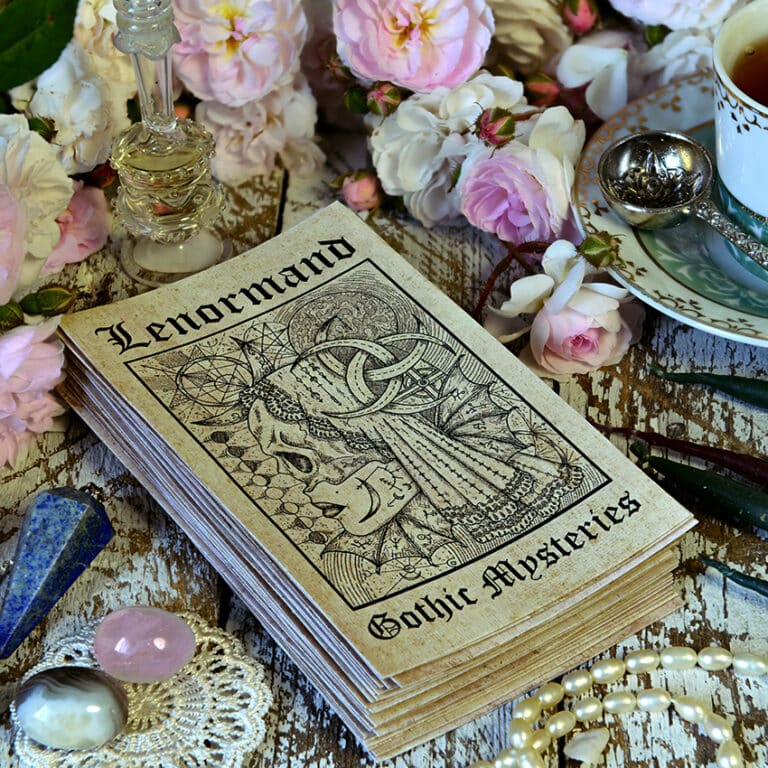It’s not Tarot, it’s not oracle, but it is a deeply intuition-based, “fortune-telling,” and age-old system — Lenormand!
If you love Tarot, chances are you’ll love Lenormand cards — but, unfortunately, it’s possible you’ve never heard of them before. Both are age-old systems used to read futures, present situations, and delve right into the heart of any circumstance, yet one seems to be significantly more well-known than the other, making Lenormand a fairly underrated system of card reading.
If you’re interested in learning cards, but haven’t quite yet taken the plunge or perhaps still have a thirst for even another deck or two, it may be time to learn about Lenormand to consider all your options.
Let’s discuss the similarities and differences between Tarot and Lenormand, and see which system, or both, might be better suited for you.
How are Tarot & Lenormand Similar?
Although Tarot has more age than Lenormand, both have been around for at least over a century, and are widely used by many cartomancers throughout the globe.
Both systems have some form of structure, and you are likely going to want to familiarize yourself with each card meaning before jumping right into slinging cards. If you enjoyed learning Tarot and cracking down to study each card, you’ll also enjoy a similar experience with Lenormand.
Like Tarot, Lenormand also has many spreads associated with the card system that can be used to lay some organization and structure into your reading, like 5-7 card spreads, or a technique called the “Grand Tableau” — which uses all 36 of its cards!
How are Tarot & Lenormand Different?
Despite the initial similarities, as well as the fact that both systems are often used by many card readers, there are arguably more differences between the deck systems than there are similarities.
Unlike oracle decks, Lenormand and Tarot both tend to abide by a particular system, order, and structure, but they do differ in what structures are used and for what purpose.
A traditional Tarot deck will often boast 78 cards, while a traditional Lenormand deck will tend to have 36 cards. In a Tarot deck, cards are split between the Major and Minor Arcana as well as four different suits, whilst a Lenormand deck does not split its symbols into separate categories or suits and presents each of its 36 cards and symbols as solo entities. And, as mentioned before, Tarot and Lenormand thus also often differ in how they are used by card practitioners.
Tarot Cards or Lenormand Cards: Which is Ideal for You?
While this is ultimately a matter of preference, and neither system is truly mutually exclusive, it can be ideal to understand what kind of system is often used for what purpose.
A Tarot deck tends to address the “how” or “why” in a situation — Why did an event happen the way that it did? How should you plan your next course of action? For example, the card 9 of Swords will depict internal battles, nightmares, and anxieties, which often can address a more emotional or spiritual aspect of a situation.
A Lenormand deck, more focused on everyday occurrences and events, will tend to address the “what” or “where” — What can you expect to see coming up for you soon? Where might you end up in a month or so? Cards like the Dog can point out someone like a friend, or a card like the Birds signifying gossip or chatter. Lenormand tends to display situations events as they are, rather than delve into why they are happening like Tarot. So, where Lenormand would read this situation simply as friends gossiping, Tarot might explain why your friends are gossiping, and point to a more internal struggle that they’re dealing with.
With that in mind, when deciding whether or not Lenormand or Tarot is for you, you might want to consider the following questions:
1. Are you interested in seeing future and present events in detail, or would you prefer to view things generally and through larger themes, emotions, and ideas?
If you’re interested in the former, Lenormand may be more for you!
2. When faced with a dilemma, would you prefer to be eased into some guidance, or shown the outcome of your choices directly?
If you’re interested in the former, Tarot may be the best option for you in this scenario!
Keep in Mind…
As mentioned earlier, Tarot and Lenormand aren’t necessarily mutually exclusive — feel free to pick up both systems if your heart so desires! But keep in mind the ways in which they differ when making any deck purchase decisions, especially so that you know what you’re getting yourself into when you pick up that deck of cards for the first time!
If you find yourself leaning towards Tarot so far, check out a free Tarot reading here if you want to try your hand at a small reading online first, or perhaps even check out a deck of cards if you’re already feeling like you’d like to take the plunge!
Related Article: How to Read the Aces of the Tarot: Breakthroughs & Beginnings
